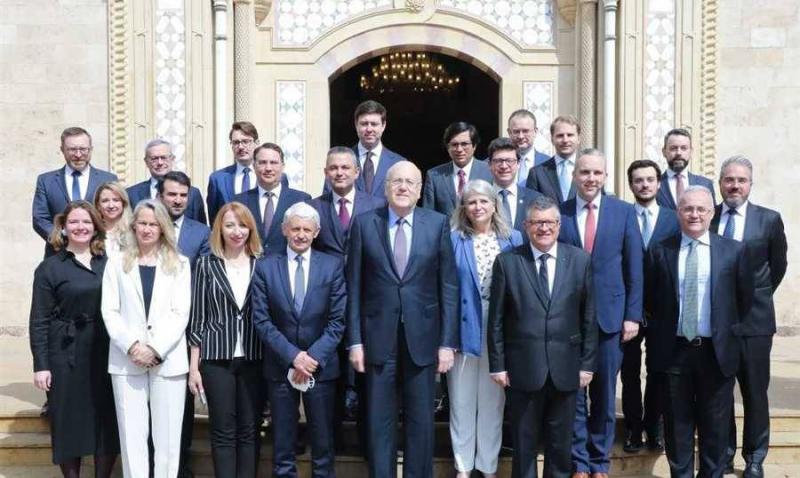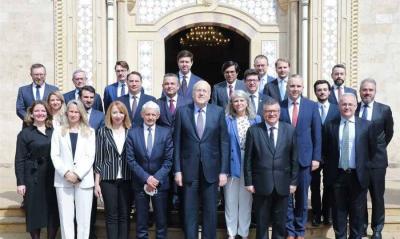Lebanese President Michel Aoun confirmed that "Lebanon is currently experiencing difficult conditions due to accumulations, erroneous economic policies, and widespread corruption, in addition to the repercussions of global and regional crises." He emphasized that “parliamentary and presidential elections will take place” and highlighted the necessity for changes in legislation, particularly regarding the adoption of decentralization to alleviate central decision-making power.
These statements from President Aoun occurred during his reception yesterday of a delegation from the European People's Party (EPP) visiting Lebanon to understand its conditions. The delegation was led by French MP Frank Prost and included members from Slovakia, Belgium, Serbia, Croatia, Italy, Latvia, Belarus, Germany, and Cyprus.
At the beginning of the meeting, delegation head MP Frank Prost thanked President Aoun for the reception, noting that “this visit aims to assess the Lebanese situation and how to contribute to assistance on both political and economic levels, especially in light of Lebanon's preparations for parliamentary elections on May 15.” He further mentioned that Lebanon is currently negotiating with the International Monetary Fund (IMF) to finalize a financial recovery plan under challenging conditions imposed by the Fund, which directly affects the acceleration of this plan’s implementation. He pointed to the urgent geopolitical situation caused by the events in Europe following the Ukrainian crisis, which impacted both the global economy and food security, as well as Lebanon's situation being influenced by regional events and its relations with Gulf countries. He expressed a constant readiness “to stand by Lebanon and support it in various fields to overcome the crisis it is experiencing.”
For his part, President Aoun expressed hope that the delegation achieves its objective from the visit and becomes informed about the various conditions in Lebanon. He stated that “Lebanon is currently facing extremely difficult situations, especially with regard to economic, financial, and political crises,” asserting that “all that is being suffered is the result of accumulations and erroneous economic policies in addition to corruption.”
President Aoun confirmed that “various countries supported Lebanon following the port explosion and sent aid, but this assistance does not suffice for a people or enable it to continue living with dignity, resulting in an increased percentage of the impoverished class in Lebanese society.” He added: “In light of the high public debt ratio today, Lebanon needs financial loans to face the economic collapse, and we are currently in negotiations with the IMF to obtain these loans as part of a financial recovery plan,” discussing “the difficulties of the conditions imposed by the IMF to implement this plan.”
In response to a question from the assistant head of the European election monitoring mission regarding a study on the possibility of establishing large polling centers "megacenters," President Aoun confirmed his personal support for the creation of “megacenters,” although some ministers expressed reservations about existing difficulties in applying this matter currently. He revealed that he would hold a meeting on this subject, “and these individuals will be convinced that the matter is not as difficult and complicated as shown in the report of the Minister of Interior and Municipalities. However, we have a method that would facilitate the issue; based on this, there will be a megacenter.”
Regarding his expectations for the parliamentary and presidential elections, he stated: “Of course, it is impossible to know the results of the electoral process at this time, but I confirm that they will take place. Likewise, regarding presidential elections, no one has declared their candidacy yet; however, there are many candidates for both the presidential and parliamentary elections.”
In response to a question, he affirmed that “the Lebanese political system is very difficult because it is based on consensus and agreement, as the Lebanese people consist of various sects. We are seeking to resolve this issue by achieving a decentralized system to reduce the central decision-making authority.”
On the possibility of European assistance to Lebanon amidst a lack of trust in the Lebanese by foreign entities, President Aoun asserted that “the Lebanese system is paralyzed and needs change through decentralization to facilitate decision-making processes and also through combating corruption by implementing criminal investigations against corrupt individuals, especially the high-ranking ones. Reforming the laws is very important, as is reforming the ruling system.”
Additionally, the European delegation visited Prime Minister Najib Mikati at the Grand Serail, where Mikati confirmed that “Lebanon, which has suffered from invasions and wars throughout its history, adheres to international law and the United Nations Charter and does not accept any aggression against the sovereignty or safety of any state, considering that the problem between Russia and Ukraine should be solved through negotiations and not military options.”
After the meeting, Prost stated: “Our visit to Lebanon revolves around examining available options for Europe to better assist our Lebanese friends in light of current geopolitical challenges that make the situation in Europe more sensitive, particularly concerning the conflict in Ukraine and its implications on Europe, which have begun to directly affect food security in Lebanon.”
He continued: “We are working on three main axes and issues. First is the political agenda in Lebanon, which includes a series of vital entitlements, including the parliamentary elections on May 15, and the municipal and optional elections that have been postponed for about a year, in addition to the economic situation through the ongoing negotiations between Lebanon and the IMF, which are characterized by some complexities in preparation for Lebanon to obtain additional loans, without neglecting the decline in the value of the national currency, causing significant difficulties for the Lebanese people. There is also the issue of Lebanon's relations with several Gulf Arab states.”
He concluded: “Despite all the complexities we have mentioned, we are ready to contribute to making appropriate decisions to help our Lebanese friends sustainably, but it is very important for the group of political partners to understand what is happening in your country.”
The European delegation also visited Ain El Tineh, where they met with the advisor to the Speaker of the Parliament, Ali Hamdan, and visited Patriarch Bechara Boutros al-Rahi in Bkerke, where the delegation listened to al-Rahi’s views on the current Lebanese situation. Prost noted that “our visit to Lebanon with a group of parliamentarians representing 16 European countries is to emphasize the importance the European Union attaches to this country and to the Lebanese and our wishes that the issues Lebanon faces be included on the European agenda,” affirming that “we feel that Lebanon is on the brink of collapse and we must assist it during these times to restore its former standing.”




